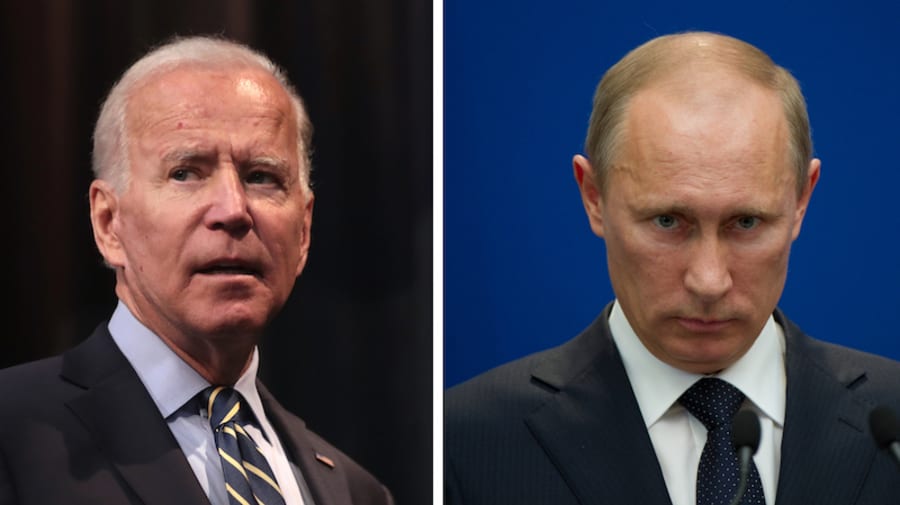In Biden’s first major foreign policy test, Putin massing 50,000 troops on Ukraine border, raising fears Russia is preparing for ‘full-scale war’
U.S. Secretary of State warns of “consequences” if Putin overreaches; Israelis, Arabs closely monitoring situation to discern Putin’s intentions, Biden’s response

JERUSALEM – Is Vladimir Putin, the would-be czar of Russia, preparing to launch a new war in Eastern Europe?
Fears of a bloody new European conflict are growing from Kiev to Brussels, from Washington to Jerusalem. And rightly so.
“Russia now has more troops on the border with Ukraine than at any time since 2014,” and Ukrainian forces are dying, said White House press secretary Jen Psaki of the year that Russian forces seized and annexed Ukraine’s Crimea Peninsula, and seized a swath of Ukrainian territory in the eastern Donbas region. “These are all deeply concerning signs.”
The commander-in-chief of the Ukrainian armed forces told CNN that “an estimated 50,000 Russian troops have now gathered across the Russian border and in Crimea” and that “there are at least 35,000 Russian-backed separatists in rebel-held areas of Ukraine.”
“The recent deployment of Russian troops along Ukraine’s border and Moscow’s indication that it could intervene in the event of a full-scale war in eastern Ukraine are dimming hopes for a peaceful resolution of the conflict that has festered for seven years and cost thousands of lives,” reported The Wall Street Journal.
Last week, in a phone call with Turkish President Recep Tayyip Erdogan, Putin accused Ukraine of resuming “dangerous provocative actions” in its eastern Donbas region, the Journal noted.
The Journal further reported that “Dmitry Kozak, deputy chief of staff of Russia’s Presidential Executive Office, warned on Thursday that Moscow would be forced to defend its citizens living in eastern Ukraine in the event of all-out war, and said this would be ‘the beginning of the end for Ukraine.’”
“Tensions have continued to mount between Ukraine and pro-Russian separatists following a recent escalation of fighting along the demarcation line inside Ukraine, where Kiev said several of its soldiers were killed last week.”
U.S. Secretary of State Antony Blinken over the weekend warned “there will be consequences” if Putin overreaches.
“I have to tell you I have real concerns about Russia’s actions on the borders of Ukraine,” Blinken said Sunday on NBC’s Meet The Press.
“President Biden’s been very clear about this,” Blinken stressed. “If Russia acts recklessly, or aggressively, there will be costs, there will be consequences.”
Israeli and Arab diplomatic and intelligence officials, while keeping mum, are closely monitoring the situation with two questions in mind.
What does the current crisis say about Putin’s intentions and willingness to use military force to achieve his objectives?
How will President Biden and his team respond?
Blinken, after all, has yet to spell out what the “consequences” of Putin’s aggression would be.
Over the past several decades, Putin has used military forces in Georgia, Ukraine and Syria with little or no firm response from Republican or Democratic administrations in the U.S.
Given that Putin is such a close ally with the Iranian regime, how the Biden administration handles this crisis could say a great deal about whether Washington is going to pursue the Ronald Reagan strategy of “peace through strength” or the Neville Chamberlain model of peace through appeasement.
“The Ukraine war, the only active conflict in Europe today, has been on a low simmer since 2015,” The New York Times reported. "Russian-backed separatists and the Ukrainian army have faced off along a 250-mile front of trenches known as the line of contact, shelling and sniping at one another but not seeking major advances.”
“The fighting picked up last month, with nine Ukrainian soldiers killed since late March,” the Times noted.
“On Friday, the Kremlin appeared to escalate the situation again by laying out a justification for military intervention on humanitarian grounds, discussing the prospect of a new war in the region in some of the starkest, most open terms yet.”
“The situation on the contact line in Ukraine is extremely unstable,” said Kremlin spokesman Dmitry Peskov. “If military actions begin and a potential repetition of a humanitarian catastrophe similar to Srebrenica arises, not one country in the world will remain on the sidelines. All countries, including Russia, will take measures.”

Joel C. Rosenberg is the editor-in-chief of ALL ISRAEL NEWS and ALL ARAB NEWS and the President and CEO of Near East Media. A New York Times best-selling author, Middle East analyst, and Evangelical leader, he lives in Jerusalem with his wife and sons.














